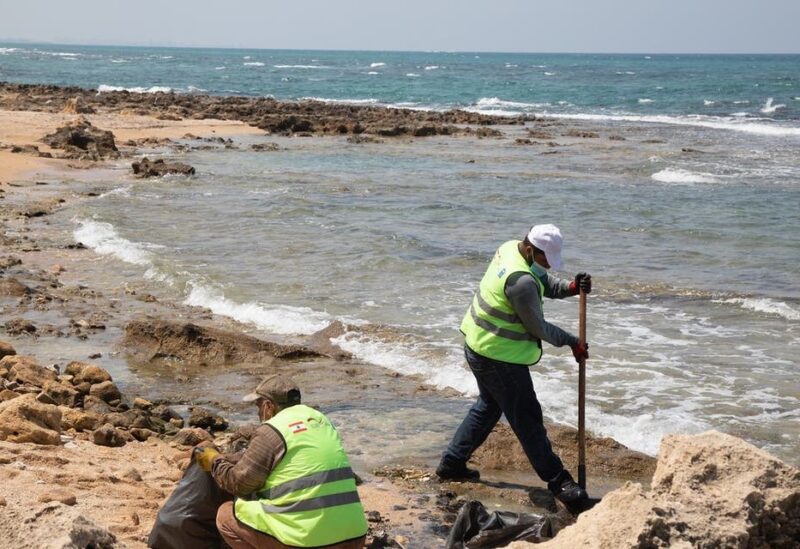
Six months ago, beaches and seaside communities across the southern coast of Lebanon found themselves flooded with toxic tar and other contaminants, washed ashore following an accident involving an oil tanker travelling through nearby Israeli waters.
Now, thanks to efforts spearheaded by the United Nations Development Program and funded by the German state-owned KfW Development Bank, the ongoing work of clearing away this unwelcome flotsam from the already struggling country’s seaside is finally nearing completion.
“The type of waste oil contamination was basically a tar-like oil residue washing up on the shore in a solid or semi-solid form,” UNDP Program Manager for Energy and Environment in Lebanon, Jihan Seoud, told Al Arabiya English. “The best way to clean those up is manually, so this is how we approached it. We didn’t use heavy machinery or equipment because it didn’t require that.
“We have actually managed to clean up most of the oil spill,” she explained. “We’re finalizing it in the next few weeks. We’re inspecting the final sites now.”
In the immediate aftermath of the spill, huge numbers of local residents and volunteers were quick to appear on the scene, eager to help. However, it quickly became apparent that a more organized approach would be required in order to affect a successful cleanup.
“In general, volunteers can only go a certain length of the way,” said Seoud. “This requires a lot of [time] and a lot of manpower, and there are also certain techniques that need to be used because you [can] end up re-contaminating the same spots. There’s a systematic approach that needs to be done.”
Without proper personal protective equipment and training, both of which the UNDP provides, improperly handling materials contaminated with oil can be potentially harmful to those attempting to remove them, as well as to the environment.
Factors, such as the weather or the time of day must be considered. At higher temperatures, oil residues become more fluid and sticky, making them more difficult to clean off hard surfaces like rocks.
Rather than simply ask for more volunteers however, the UNDP ensure that all of their workers receive payment for their efforts. With over 70 percent of the Lebanese population currently unemployed and the local currency having lost much of its value, this is a welcome bonus for many struggling to find work.
“The program is called ‘Cash for Work’; it’s one of the mechanisms that the German government has been supporting, creating short-term jobs for the local vulnerable people and refugees,” Seoud explained. “It’s a daily rate [with] a minimum wage of $7 (USD) per day.”
Collected oil waste is then transported to the Zahrani Oil Refinery and temporarily stored in UN standard drums, in line with best practice.
With Lebanon’s normally lucrative tourism sector already suffering due to travel restrictions imposed in response to the global COVID-19 pandemic, many feared that a compounding ecological disaster polluting coastal waters could push these businesses – and the families they support – to breaking point.
Fortunately, this hasn’t been the case, thanks to quick action from both local residents, and the coordinated efforts of local and international authorities.
“The National Council for Scientific Research (CNRS) did an initial assessment in partnership with the United Nations Environment Program (UNEP), the [Lebanese] Ministry of Environment and the municipalities in the south that were affected,” said Seoud. “They let us know exactly where contamination was and certain areas where it wasn’t easy to find. They were very keen and involved.
“We also received support from the Regional Marine Pollution Emergency Response Centre for the Mediterranean Sea (REMPEC),” she added. “They sent out experts who supported us in scoping and determining the extent of the oil spill and the best approach to cleaning it up.”
Although the full extent of the environmental impact of the oil spill is still unclear, the UNDP is confident that the majority of the oil spill residue has been safely removed. With their part in the recovery effort almost complete, it now falls to other local groups to continue the work.
Small amounts of tar balls and fragments are still reportedly washing up on shorelines, but these are likely coming from other sources elsewhere in the Mediterranean carried by sea currents. They are not believed to pose a direct threat to environmental wellbeing.
“New contamination is also something we’re debating now with the handover,” explained Seoud. “We work on a project basis, so we don’t have a long term plan. That is not our role, but the government and the municipalities [will] continue to monitor, as will the CNRS as well.”
“You inspect and you assess,” she concluded. “The Mediterranean is not exactly a very clean sea [and] we can’t keep cleaning the beaches; there has to be a cutoff at some point.”